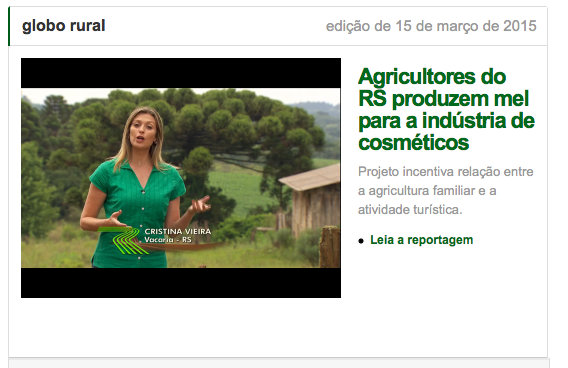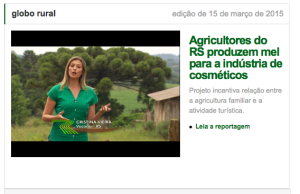
RS's farmers produce honey for the cosmetics industry
Vacaria cooperative of beekeepers received special training. Project encourages relationship between family agriculture and tourism.
By Cristina Vieira – Dairy, RS
Honey produced by small farmers in Rio Grande do Sul is turning cosmetic. The destination are chains from all over Brazil. This is a project that unites family farming to tourism sector.
In one of several hotels in São Paulo, guests receive cosmetics made honey base. The products are the tip of a chain that begins in the field.
It is Vacaria, in northeastern Rio Grande do Sul, leaving the honey used in the manufacture of many cosmetic. The state is the country's largest producer of honey. The municipality, known for producing apples, also has very varied vegetation to wild honey production: araucaria, eucalyptus, guamirim, gorse, are some of the hundreds of species of trees in the region.
Beekeepers, Alair Vargas and Paulo Rodrigues explain the use of the fumigating. "When the smoke is applied, feeding the bees honey, fearing the sack in the hive. While feeding, they are left with hard abdomen and find it difficult to bend it to sting. Well fed, they also become more sleepy”, explains Alair.
Beekeepers give as are the combs. “They are ready when they are operculado 100%”, the firm. So, operculado comb is when it is covered by a thin layer of wax, It is indicating that Mel is ripe or já.
Alair Vargas has almost 30 Years of Experience, was an official of the metallurgy industry, but now dedicated solely to the production of honey. He takes care of 750 hives, in 25 apiaries. Most in leased areas.
One of apiaries is the site four hectares family. Alair does not regret the choice you made. "It's a harder job than in industry, But the satisfaction of working in a healthy environment, the nature and the bees, It is big", the firm.
Alair and Paul are part of the Cooperative Beekeepers Vacaria (Avapis), selected to participate in the project “Rural Brazil Talents”, providing honey for the cosmetics industry. For it, beekeepers received training. "I have to be careful about invasive pests in hives, exchanging Queen, know when she's producing well. All this to have a good production at the end ", says Paulo Rodrigues.
Honey taken in the field is taken to agribusiness, which is extracted from the combs in a centrifugal. Then it is decanted by 72 hours for a removal of impurities. For this stage, producers also receive guidance on good practice. "Making this honey extraction process, how to use the equipment and how to use the garment. Cleaning issue, sanitation… So for us it was very interesting. And we have more security you are doing and the product we are delivering to the consumer ", evaluates Paulo.
Before going to industry, honey coming out of Rio Grande do Saul needs to be made into extract. In a company in the metropolitan region of Curitiba (PR), the product is no longer food and becomes a raw material for the manufacture of cosmetics.
The main characteristic of honey as a cosmetic which is, depending on the sugar content, hydration it forms a film on the skin and hair.
The pharmaceutical Ana Carolina Heemann been in Vacaria to guide producers and verifies that the product meets the standards set out in the project. "In proper packaging, We analyze the labeling, validity, The batch of product, then the characteristics of honey ", says.
She analyzes color, odor, density, pH, the acidity as well as the sugar content of the product. Turning tests in the honey starts to be transformed with the use of preservatives and antioxidants. "Honey when I arrive here, It is suitable for consumption as food. It should not be used as a cosmetic raw material because it can crystallize and thus influence the production shampoo, Conditioner, lotion. Then we realize transformation processes, adding other ingredients that prevent this from happening”, said pharmaceutical.
In the form of extract, honey follows for industry. In one of them they are produced 14 cosmetic lines for hotel chains, wherein a has a differential: packaging and labels are rciclável stuff. "In this project we know who produced. In other extracts that we utlizamos, there is a clear origin, but this is specifically the honey Avapis Cooperative, Vacaria. Any consumer use this produto, You know you're using something that is the work that little farmer ", says Mauro de Oliveira, commercial director.
The Cooperative dairy, beyond the value of the sale of honey, still has a financial return on each of cosmetics: 5% of what is sold back for beekeepers. The Avapis can also sell Products. "It's a gain for cooperativado. In our region is used basntante bee to pollinate more, then it is a way of staff start working to produce honey also on a larger scale than we produce today”, says Edson da Silva, beekeeper.
Today, the 49 cooperative produce 60 tons of honey a year and plan to build a new headquarters to increase agribusiness. "When I began working with beekeeping, I never imagined that one day our product would reach a cosmetic manufacturing and distribution for all of Brazil ", Alair said Vargas.
The beekeepers learned in the project is being reflected in productivity. Some hives are already yielding 50% a mais de mel.
Access the link to the report in the Global Rural : Issue of the day 15/03/2015 ; 08:45


Sorry, the comment form is closed at this time.